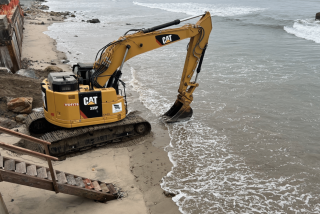Political Extortion Claimed in Suit : Case Points Finger at Unnamed Coastal Panel Member
In a lawsuit filed this week by two Santa Monica Mountains landowners, an unidentified member of the California Coastal Commission is accused of extorting political contributions in exchange for approval of a residential development in the rugged hills above Malibu.
When Quaker Corp., one of the landowners, sought permission in 1985 from the Coastal Commission to subdivide 272 acres near the intersection of Mulholland Highway and Las Virgenes Road, a commissioner suggested “that Quaker make financial contributions to members of one of the major political parties involved in the appointing process of coastal commissioners,” the lawsuit filed on Monday alleges.
Democratic Assembly Speaker Willie Brown, the Democratic-controlled Senate Rules Committee and Republican Gov. George Deukmejian each appoint four members of the commission.
Rossco Holdings Inc., which controls Quaker, is one plaintiff in the suit. The other is Michael T. Ghosn, who owns 160 acres southeast of Quaker’s property.
Their suit, filed in Los Angeles Superior Court, challenges the boundary of the Malibu portion of the coastal zone, the area in which the commission has final authority over construction. It claims the boundary was drawn too far inland and seeks to reduce the zone by about 6,000 properties.
‘Practice of Extortion’
The lawsuit calls the commissioner’s overture “a policy of fund-raising” and “a practice of extortion by certain members of the Coastal Commission . . . by which approval was conditioned.”
The commissioner was not identified because the plaintiffs still have not determined whether the approach came from “the commission itself or from the political party directly,” said Joseph M. Gughemetti, a San Mateo attorney representing Rossco and Ghosn.
“There are a few individuals involved,” Gughemetti said. “We do not now know whether their activities were on their own or whether they were the messengers of others. We want subpoena power to get into the records and contacts of these people.”
Ralph Faust, chief counsel for the coastal commission, said, “I don’t know what kind of response we can make, really. In the absence of specific evidence, I have to assume that that’s not true.”
Deputy Commission Director Tom Crandall added, “Those kinds of accusations are irresponsible and don’t reflect well on those seeking to change the coastal zone boundaries. I would expect that since it’s part of the lawsuit that they’ll have to bring forth their evidence.”
Gughemetti said that in addition to the contributions, Quaker was asked to hire a particular lobbyist.
35 Houses Approved
The coastal commission in 1985 approved 34 houses on the Quaker property. But Quaker is now contesting conditions imposed on the development in a separate court case.
The Times reported earlier this month that a Chevron Corp. attorney said Commissioner David Malcolm, a Chula Vista city councilman, had suggested that Chevron “should be talking to” Sacramento lobbyist Bernard Teitelbaum, who represented other companies before the commission. The attorney, Cynthia Norris, told The Times that Malcolm had said Teitelbaum could deliver the votes needed to win approval of the oil firm’s drilling project.
Malcolm denied Norris’ contention and said one of Chevron’s consultants threatened to retaliate against him politically when he did not yield to pressure to change his vote against the company’s project.
Gughemetti said his clients’ allegation “is similar” to Norris’ claim.
But “we thought it would be premature to start identifying individuals now,” he said. “I just don’t want to talk about that aspect now.”
Times Staff Writer Kenneth J. Garcia contributed to this report.
More to Read
Sign up for Essential California
The most important California stories and recommendations in your inbox every morning.
You may occasionally receive promotional content from the Los Angeles Times.









